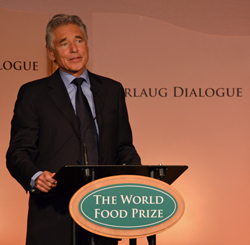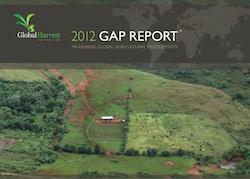 |
|
Chairman of the Board
of Directors, Nestlé
|
A number of the Borlaug Dialogue sessions will be webcast live, available free to the public to watch.
This three-day dialogue explored topics such as:
- What will a future landscape of a hungry world look like and how will we feed it sustainably?
- Water and Environment – How can agriculture become a part of the conservation solution and not the problem?
- Feeding Capacity – Studying past successes and future opportunities for academia to influence the global conversation
- Nutrition Value – Integrating nutrition across the entire value chain from production to consumer
- Working Capital – Leveraging global financial tools to empower smallholder farmers and entrepreneurs
- Measuring Success – From stockholder to smallholder, what are the common indicators for a successful partnership?
- Game Change – Emerging technologies shaping the future of food & agricultural development
- Waste Not, Want Not – Increased productivity is only one part of the food security equation. What are the advancements in minimizing waste in the supply chain, especially in post-harvest loss?
- Spread the Word – The role of the media in informing the public and bringing food security issues to the forefront

Collaborating for Growth: How public-private partnerships are improving nutrition, productivity and sustainability
CropLife International and a panel of experts discussed how unique, new partnerships will create economic and environmental benefits for farm communities. Panelists will share stories on three high-profile partnerships that are breaking new ground to provide greater global nutrition, crop yields and farmer advocacy.
Speakers Included:
-Denis Kyetere - Executive Director, African Agricultural Technology Foundation. Sharing the success of the Water Efficient Maize for Africa Project
-Marc Albertsen - Senior Researcher Fellow, DuPont-Pioneer. Presenting Progress of the African Biofortified Sorghum Project
- Robert Carlson - President, World Farmers Organization. Discussing achievements of the Farming First Coalition
Speakers Included:
Sir Gordon Conway - Professor of International Development, Imperial College London
Gebisa Ejeta - Distinguished Professor of Plant Breeding & Genetics & International Agriculture, Purdue University
Susan Godwin - Smallholder Farmer, Nigeria
Jane Karuku - President, Alliance for a Green Revolution in Africa (AGRA)
Roger Thurow (Moderator) - Senior Fellow, The Chicago Council on Global Affairs
This session discussed on a high level the future landscape of feeding a growing population in a world affected by environmental, geopolitical, technological and other pressing challenges.
Specifically, this conversation explored the following:
- How can we put current issues in perspective with regard to the future? Where should we prioritize?
- What do we have to look forward to in terms of developments to combat global hunger?
- What are some important questions regarding this issue that have yet to be asked?
- What does it really mean to cultivate effective partnerships? Why are some effective and some not?
- How do we advance agricultural development while minimizing environment impact?
- How do we bring all interests and stakeholders to the table in an equitable manner?
Reducing Postharvest Loss to Advance Food Security
This seminar, hosted by the ADM Institute for the Prevention of Postharvest Loss, addressed knowledge gaps which contribute to the loss of agricultural produce in food supply chains and the means to reduce those gaps.
This seminar, hosted by the ADM Institute for the Prevention of Postharvest Loss, addressed knowledge gaps which contribute to the loss of agricultural produce in food supply chains and the means to reduce those gaps.
Working Capital: Leveraging Global Financial Tools for Smallholder Farmers
Speakers Included
Walter Bell - Board of Directors, Swiss Re America Holding
Raymond Offenheiser - President, Oxfam America
Sano Shimoda - Founder and President, BioScience Securities
Jack Sinclair - Executive Vice-President, Walmart Grocery Division
Carolyn Woo - CEO, Catholic Relief Services
This side event, hosted by USAID and its U.S. Government partners in the Feed the Future initiative, will be moderated by author and journalist Roger Thurow and will highlight how investments in agricultural research and capacity development under Feed the Future are impacting lives worldwide. The session will include a panel discussion with major partners from the private sector, U.S. universities, and international research centers; AgTalks from key researchers; and dynamic content showing the impacts of the portfolio and future leaders in agricultural research.
Waste Not, Want Not: Solutions for Reducing Post Harvest Loss
Betty Bugusu - Managing Director, International Food Technology Center
Jeffrey Klein - President and CEO, The Global FoodBanking Network
Rajesh Kumar - Smallholder Farmer
Steve Sonka - Director, ADM Institute for the Prevention of Postharvest Loss
Betty Bugusu - Managing Director, International Food Technology Center
Jeffrey Klein - President and CEO, The Global FoodBanking Network
Rajesh Kumar - Smallholder Farmer
Steve Sonka - Director, ADM Institute for the Prevention of Postharvest Loss
Value Added: Integrating Nutrition for Human and Animal Health
Marc Van Ameringen - Executive Director, Global Alliance for Improved Nutrition (GAIN) (moderator)
Florence Chenoweth - Minister of Agriculture, Liberia
Jim Gerardot - Executive Director of Solutions, Novus International
Mehmood Khan - CEO of the Global Nutrition Group, PepsiCo
Katherine Pickus - Divisional Vice President, Global Citizenship and Policy, Abbott
Marc Van Ameringen - Executive Director, Global Alliance for Improved Nutrition (GAIN) (moderator)
Florence Chenoweth - Minister of Agriculture, Liberia
Jim Gerardot - Executive Director of Solutions, Novus International
Mehmood Khan - CEO of the Global Nutrition Group, PepsiCo
Katherine Pickus - Divisional Vice President, Global Citizenship and Policy, Abbott
Related:
 The Global Harvest Initiative’s (GHI) annual Global Agricultural Productivity Report® (GAP Report®), was released on October 17, before an audience of global thought leaders, agricultural industry experts, farmers, and international development professionals. This is the third annual GAP Report® released by GHI since the organization’s inception in 2009.
The Global Harvest Initiative’s (GHI) annual Global Agricultural Productivity Report® (GAP Report®), was released on October 17, before an audience of global thought leaders, agricultural industry experts, farmers, and international development professionals. This is the third annual GAP Report® released by GHI since the organization’s inception in 2009.Download the 2012 GAP Report® (PDF) Related: October 16, 2012. A pioneer who made arid lands bloom is the recipient of this year's prestigious World Food Prize. Daniel Hillel developed drip irrigation techniques that squeeze the most crop out of a drop of water, making farming possible in places where water is scarce. Hillel’s orchards near his home in Israel are innovation in action. Each tree row is fed by plastic tubes which drip water at the base of the tree. Irrigating drop by drop - called drip irrigation - has transformed agriculture by dramatically reducing the amount of water needed.
Related: The African Market Garden
A smarter approach to agriculture, is for farmers to produce more vegetables for home consumption and sale in urban areas. As a result, Pasternak has developed the Africa Market Garden concept. In Tanka village, 50 women have started farming using solar drip irrigation to grow okra, tomatoes, eggplant, and other vegetables, as well as moringa and fruit trees. The women each manage their own plots, but share tools and water—and skills—with one another. They all contribute their earnings to a group savings account to pay for things like fertilizer or to replace hoses and other materials. By selling their vegetables at nearby markets most of the women have tripled their incomes from about $USD 350.00 per woman per year to more than $1,000.00. And that extra income means that their families eat better, that they can send their children to school, and buy clothes and other things they need.


No comments:
Post a Comment